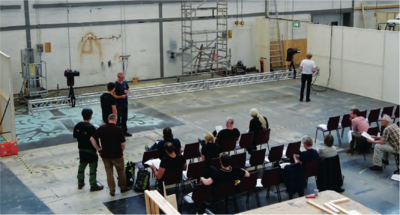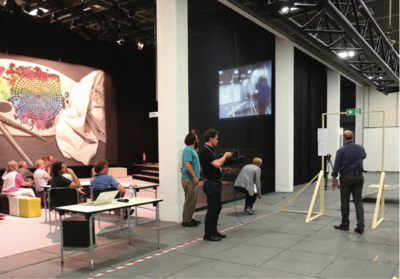Building a culture of safety requires a shared understanding of safe working practices. In the highly international theatre and live event industries, the ETTEC safety passport provides a way to test and certify a common standard for safe working.
The ETTEC (Q30573) safety passport is a certificate that proves that a professional can work safely on stage or in an event environment. The Passport reflects the vision that safety is a way of life. Everyone on stage, from stagehand to project manager, should be able to behave safely, understand the mechanics behind working safely and develop a critical safety mindset. Unlike other safety courses, the ETTEC safety passport focuses not on legislation but on competence, on mastering safe working practices. It is about ‘being able’ rather than ‘knowing’.
The origin of the project lay in an informal meeting in the side-lines of an OISTAT (Q30470) gathering during the Prague Quadrennial. During the discussion the people present came to the conclusion that it was hard to prove that a worker, coming from another country, was able to work safely. To their surprise, they realised there was a lot of information on high level safety and safety management, but hardly any definition or concrete text on what it means to work safely on a basic level. And so the project was born.
The passport was developed in a Erasmus+ European project (September 2014 to August 2017), led by DTHG (Q19499) and with VPT (Q30569), OSAT (Q30570), STTF (Q30571), STEPP (Q92) and RITCS (Q13001) as partners. The passport indicates that the employee has demonstrated that he can work safely, tested through a practical standardised international assessment. Based on the input of a wide group of stakeholders, the partners wrote a set of ten competences that were later proposed to the European ESCO (Q30572) database:
- Working with respect for your own safety.
- Contributing to a safe and sustainable working environment.
- Working ergonomically.
- Use personal protective equipment.
- Fire prevention in a performance environment.
- Safe working at height.
- Working safely with mobile electrical systems under supervision.
- Working safely with tools.
- Working safely with chemicals.
- Fitting up and rigging stage equipment.
These competences were further described in a sectoral layer, with detailed description of skills knowledge and attitudes that can be used for education, training and assessment. The project went on to develop a student’s handbook and an extensive teacher’s manual in English, German, Dutch and Swedish (Q30577).
Finally, the partners also developed a practice-based assessment procedure that guarantees objective and independent measurement of candidates for the passport in different countries. It consists of a practical test in a simulated environment. A candidate is led through a series of real-life situations that contain typical risks that occur in an event or theatre context. Two assessors observe the candidate’s behaviour and decide at the end if they are able to work safely on stage.
The assessors are trained, certified and accredited to carry out the tests by an international consortium. They work independently from the assessment centres to ensure their objectivity and independence in judging the candidate. The validity of the certificate is based on mutual recognition, each assessment centre recognises the certificates of the other centres, making it, de facto, an international certificate. The assessment centres all use the same occupational standards and quality procedures, and safeguard collectively the quality of assessment. In this way they can be sure that a certificate delivered by another member of the scheme has the same value as their own.
The content of the project is published under a Creative Commons ‘Attribution-NonCommercial-ShareAlike’ licence. This means that everyone is allowed to use or translate it for free. It has been translated in Finnish, Russian and Chinese. In 2021 the Flemish social fund for the performing arts developed an online training based on the passport content.
In 2019 the partners founded a new organisation called ETTEC (Q30573) to coordinate the continued activities. The mission of this association is the mutual recognition of certificates and qualifications in the field of live performance and entertainment between the member organisations. Aside from the founding members, IGVW (Q30574) and Metropolia (Q30576) have also joined. The organisation wants to extend the mutual recognition to other certificates. To reach this goal, they are working together with different projects and organisations in the field(s) of event and technical theatre.

